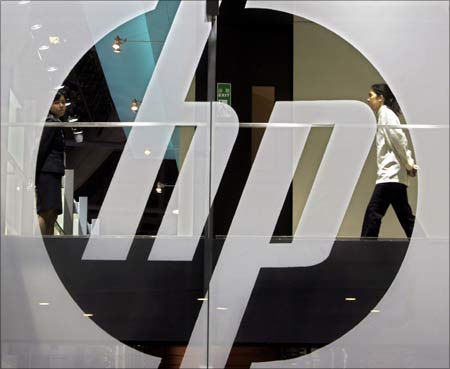
Perceived till recently as low-budget and low-margin, the domestic market now means big business to Indian IT majors.
Wipro, the low-profile Bangalore-based FMCG and software services company, in May bagged a Rs 2,200 crore (Rs 22 billion), nine-year contract with Unitech Wireless. To begin with, it will integrate the operations of the company with the use of enterprise resource planning and host all its data centres.
Subsequently, it will also operate and maintain the information technology network of the newly-formed mobile services company. There were several players in the race for the order but Wipro bid aggressively to breast the tape.
Earlier in the year, Wipro had signed a Rs 3,000 crore (Rs 30 billion) contract with Aircel and got a Rs 1,182 crore (Rs 11.82 billion) e-governance order from the Employees' State Insurance Corporation.
Not to be left behind, Tata Consultancy Services, the country's largest information technology company, recently signed a Rs 1,200 crore (Rs 12 billion) deal with the government to migrate passport services to the electronic platform.
Delhi-based HCL Infosystems has got a seven-year, Rs 400 crore (R 4 billion) system integration order from state-owned Bharat Sanchar Nigam Ltd. IBM too is learnt to have landed some large deals in 2009.
Text: Leslie D'Monte
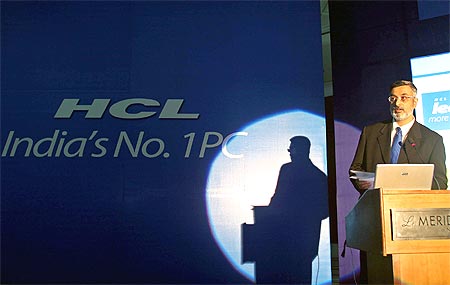
How the recession in the West has changed the priorities of IT companies!
Perceived till recently as a low-budget and low-margin 'documentary' film, the domestic market has turned out to be the latest action-packed thriller. Orders that run into thousands of crores are being placed from companies in the telecom, finance and manufacturing sectors.
Eager to revive the sagging economy, the government is ready to run huge deficits and write large orders for IT hardware and software. Naturally, every IT company now sees it as a happy hunting ground.
From IBM and Hewlett-Packard (it had bought software services provider EDS recently) to homegrown majors like Wipro, TCS, HCL Infosystems, Satyam and now Infosys also, all want a slice of the pie.
The reasons are not hard to find. The US and UK markets -- which account for almost 80 per cent of the revenues of most IT companies -- have slowed down considerably. Companies there have reduced IT spends and are going slow on outsourcing.
Two, IT firms earn in dollars; so, a single percentage rise in the Indian rupee can erode their operating margins by 30-50 basis points. Three, on the back of Americans losing millions of jobs, the anti-outsourcing 'protectionist' cries of US Senators and President Obama are hurting sentiment.
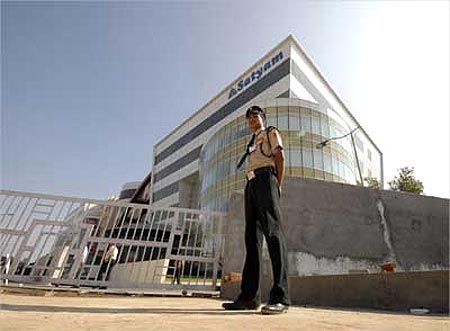
It makes sense, therefore, to cater to a market whose GDP is still growing at 5-6 per cent, and whose government wants to spend thousands of crores on e-governance, broadband and digitisation.
For long, this was an unattractive market. Any government contract has always been handed out to the lowest bidder. This makes the margins as thin as a wafer. Not any longer, say experts. As the payment is in rupees, it is immune to currency risks. Analysts note that the margins are now comparable to overseas deals.
Moreover, as Indian companies across sectors plan to go global they will require IT services to integrate their operations and reduce the go-to-market time. There is a large base of small- and medium-sized businesses which do not want to spend large sums of money on setting up full-fledged IT departments. This opens a huge market for modular and reasonably-priced off-the-shelf solutions, which companies like IBM, TCS, Wipro and HP have been quick to devise.
The Indian IT services market, according to Gartner, is pegged to grow to $10.73 billion (Rs 515 billion) by 2011. IDC estimates the domestic IT services market, currently around $6 billion (Rs 288 billion) to touch around $13 billion (Rs 624 billion) by 2012.
The projected outsourcing potential of the domestic market (IT and business process outsourcing or BPO) in 2012, according to research firm Tholons Advisory, is around $13 billion (Rs 624 billion) -- telecom: $5 billion (Rs 240 billion), insurance: $1.5 billion (Rs 72 billion), banking: $6 billion (Rs 288 billion) and healthcare: $450 million (Rs 22 billion).
If other sectors are included, the figure will only increase. If hardware is added, the current market could easily be in excess of $10 billion (Rs 480 billion).
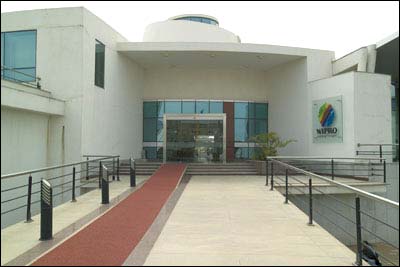
Wipro comes of age
Wipro is no stranger to the domestic market -- it had started out as a vegetable oil company and produced laundry soaps in the very year that India got Independence. Ironically, it was when IBM (the leader in the domestic space today with a market share in excess of 10 per cent) was asked to leave India in 1977 that Wipro and others entered the IT sector.
Wipro, according to Wipro Infotech Vice-president (sales) Anurag Mehrotra, spent time till 1987 "establishing a pedigree in hardware," concentrated next on systems integration and networking, graduated to professional services and managed IT services, and has now got into application development and consulting to "become an end-to-end solutions player."
This, according to Mehrotra, has helped Wipro bag large multi-layered deals like Unitech Wireless. Similarly, the Aircel order requires Wipro to deploy applications such as retail billing and revenue assurance and integrate and manage them. Wipro will take on its rolls 100 employees of Aircel, and expects to have around 400 people working on the Aircel project over the next one to two years.
Apart from this and the ESIC order, it has also struck a Rs 200 crore (Rs 2 billion, estimated) IT outsourcing deal with the Life Insurance Corporation of India which involves making LIC's front-end accessible on the Internet. It will be executed over a period of five years.
The price quoted by Wipro in most of the recent bids is said to be far below rivals, which has helped it bag deals. For instance, the company's quote of Rs 1,182 crore (Rs 11.82 billion) for the ESIC bid was way lower than TCS' Rs 1,530 crore (Rs 15.3 billion) and Infosys' Rs 1,791 crore (Rs 17.91 billion).
IBM did not appear keen to participate in the bid.

Alok Shende, principal analyst of Ascendia Consulting, while giving Wipro credit for the wins in a slowing economy, points out that in the Unitech Wireless deal, Wipro's price was 40 per cent lower than that of TCS. "In its enthusiasm to close deals, is Wipro under-pricing and will that not impact its profits in the long term," he asks.
The telecom sector, though all set to boom with new entrants in the bandwagon, is fraught with risks.
Given that the mobile services markets is close to saturation and therefore new telecom operators will have to struggle against established players to acquire subscribers, there is the risk of a new operator not honouring the contract in case it gets acquired mid-way. There is also the danger of the full contract value not being paid in case subscribers don't show up as projected, since most deals are linked to subscriber growth.
"It's a complex issue. Pricing is just one bit of the puzzle," counters Wipro's Mehrotra. "We have figured out how to deliver services in a cost-effective manner which others are yet to learn. We have a network operation centre in Mysore which delivers remote services -- not only managed IT services but also break-fix support (unless a part is broken physically). We thus save on costs in a big way by saving on resources. Sending an engineer to the site, for example, involves loss of man-hours, productivity and delayed customer satisfaction."
Wipro has also mastered the art of transaction-based pricing which has played a key role in the recent orders it has won. For instance, a bank will be billed for each customer transaction rather than a pre-decided sum.
If footfalls increase, it's a win-win situation for both the bank and the IT vendor. If there's a fall in the customer base, the risk is contained for the bank. This is opposed to outcome-based pricing where the bank shells out a huge sum of money upfront.
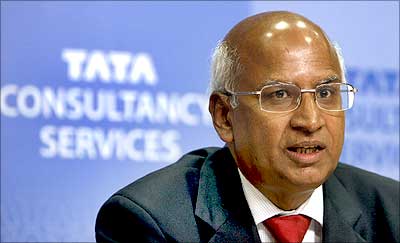
TCS makes quiet progress
TCS Executive Director and CEO-designate N Chandrasekaran expects to double the revenue from the country over the next three or four years. The company, according to Country Head (India business) G S Raghavan, "believes in bringing its entire branding and global experience to its local clients."
Like Wipro and IBM, it has an integrated business unit (as opposed to just sales offices) to address customer acquisition, management and delivery. "We have around 12,000 people dedicated to the India business," he asserts.
"Our biggest difference," says Raghavan, "is that we have become a part of the growth story of our clients. For instance, we have helped our insurance clients start operations in six to nine months, which has saved them money. In the retail sector, we have used inventory management and periodic audits to help our customers (he is not willing to name its Indian clients) turn cash positive."
TCS has a very strong footprint in the finance sector which happens to be the largest buyer of IT services in the country. Fifteen of the top 30 players in the industry are its customers. Five of the top 10 Indian retailers are its customers too. In the insurance sector, it works with 15 of the 24 players.
At the moment, TCS has around four per cent of the domestic market for IT services. If group company CMC is included, then the share could rise to six per cent. Though it trails IBM by a huge margin, sector experts say TCS is the company to watch in the domestic space in the days to come because of the work it has done with the Centre and various state governments.
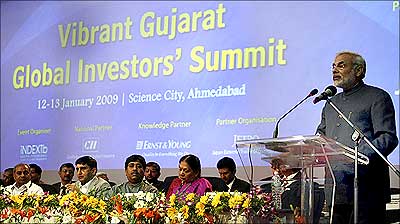
TCS, according to Vice-president and head of e-governance Tanmoy Chakrabarty, has developed a tool called digi-gov, which has been implemented in Gujarat, Bihar and now Orissa, to take care of all intra-government tasks and digitise all paper files.
The company also has joint ventures with the Andhra Pradesh and Madhya Pradesh governments for a citizen-delivery model "which takes governance to the citizens' doorstep and is a replicable framework." It is also helping the governments of Assam, Bihar and Gujarat with software to reconcile budgets and expenditure.
Last, but not the least, it has implemented digi-tax in 11 states to help state governments augment their revenue collections. "We are replicating this framework globally too, Uganda to start with," says Chakrabarty, adding, "Others look at IT as an input. We look at IT as an outcome."
Recently, it has introduced the concept of an ePort at the Kochi port. The project integrates the port's operational, financial, real estate and human resource systems on an integrated port information system.
When fully functional, it will provide a real-time interface with customs, port users, banks and the port community system of the Indian Ports Association. The system will provide a single-window facility to the trade for filing applications, receiving service bills, payments and enquiries.
The space poses "a major $5-10 billion (Rs 240-480 billion) opportunity over the next five years" for TCS as the government plans to roll out its 30 mission mode projects (of which TCS has already bagged two).
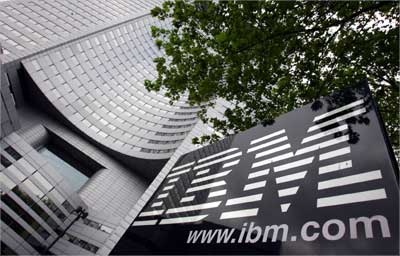
IBM leads the pack
In the 16 years since IBM re-entered India (it was thrown out by the Janata Party government in the late 1970s), India has become its fastest-growing market. According to IBM executives, a 3-D strategy is the key to its success: Deepening client relationships, Differentiated solutions and Delivered globally.
Five years ago, Bharti Airtel wanted a partner to manage growth, not simply reduce costs. IBM won a fierce round of bidding by a whole pack of IT companies. Under the deal, Bharti's hardware, software and IT service requirements were outsourced to IBM.
The story did not end there. The relationship has continued into a "joint go-to-market arrangement." A part of IBM's revenue from this deal is linked to Bharti's subscriber growth.
It was a good bet for IBM -- Bharti's subscriber base has since increased 10 times. And if the MTN deal goes through, IBM may gain in multiples since it has an existing outsourcing deal with MTN too. Its other India telecom customers are Vodafone and Idea Cellular.
Big Blue's felicity is not limited to telecom. IBM India Vice-president and General Manager (global technology services) Nipun Mehrotra points out that the Indian National Center for Ocean Information, for instance, has partnered with IBM to set up a tsunami-warning system.
The technology provided by IBM helps the centre collate and analyse a wide range of geospatial data to predict a tsunami. In addition, the IBM solution also helps it provide advisory services to fishermen so that they can identify the fishing zones in the sea best suited for a good catch.
In the last 18 months, according to Mehrotra, IBM has struck a comprehensive infrastructure and technology services deal with Union Bank of India, a five-year agreement with the Central Board of Direct Taxes to modernise its IT infrastructure, and an enterprise resource planning deal for the Indira Gandhi International Airport in New Delhi.

All told, IBM has sewn together five- and ten-year deals worth $2.5 billion (Rs 120 billion) in the country during the last five years. To max its revenues, it has now decided to target the next level of banks.
In March it entered into a ten-year managed IT services agreement with Kurmanchal Nagar Sahakari Bank, an urban co-operative bank in Uttarakhand. IBM will remotely host and manage the IT infrastructure for the bank from its data centre in Bangalore. IBM will also manage the bank's disaster recovery site.
IBM and Financial Information Network and Operations, a technology provider in the micro-finance sector, have announced a partnership for the deployment of a core banking and end-to-end smart card solutions for Janalakshmi Social Services, an urban micro-finance institution based in Bangalore.
With these smart cards, traders will now have anytime access to the trading floor without having to carry cash and/or resort to expensive loan arrangements through money-lenders.
IBM's strength lies in the fact, says Mehrotra, "that it can offer end-to-end solutions: Hardware, software, services, consulting and back-office operations from anywhere in the world."

Global leader, local laggard
But what about India's second-largest IT services provider, Infosys? Well, it's just getting its feet wet here with India contributing around 1.3 per cent of its total revenues. The larger part of its revenue in India comes from its banking product, Finacle.
It has, however, realised the potential of India and last year announced the formation of a separate business unit to focus on just the domestic market.
Infosys recently signed an e-governance deal with the Income Tax Department to establish back-office hubs across four states. In the private sector, the company has about six customers including Thermax. And it is ready to up the ante.
In May, the company is understood to have bagged a prestigious six-year eBiz project of the Department of Industrial Policy and Promotion in a bid which also saw participation from TCS, HCL and Wipro among others. Infosys will develop the eBiz portal which will work as a one-stop shop to provide efficient services to investors, business and industry.